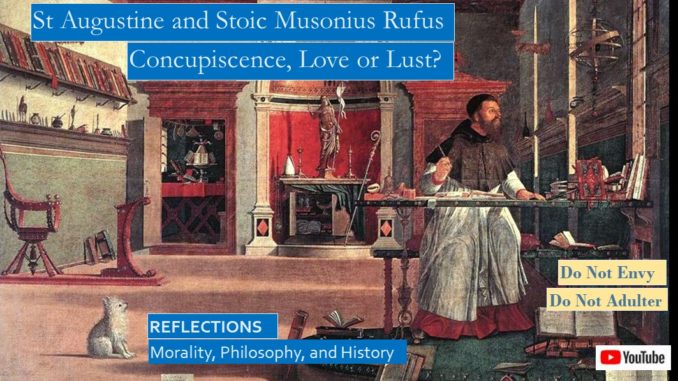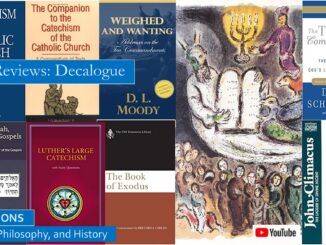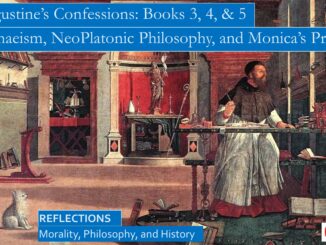
What can we learn from St Augustine so we are not the slaves of our concupiscence, so we can restrain concupiscence in our marriage so it works for the good? To learn from St Augustine, we must read his works hagiographically rather than critically. If we treasure the teachings of the Church and tradition we cannot reject the core teachings of the church fathers, but after that hurdle if we still desire to reject the teachings of St Augustine, the burden is on us to study the exhortations of Scripture and the teachings of the moral philosophers before we can reject the teachings of the early Church.
St Augustine on Concupiscence, Blog 1 http://www.seekingvirtueandwisdom.com/st-augustine-on-concupiscence-blog-1/
See related blog: Musonius Rufus on Concupiscence and Controlling the Appetites
http://www.seekingvirtueandwisdom.com/musonius-rufus-on-concupiscence-and-controlling-the-appetites/
The best electronic version of Nicene and Post-Nicene Fathers, Series 1, Volumes 3 and 5, containing these works, is at: https://www.christianbook.com
YouTube video, St Augustine, Stoic Musonius Rufus, & Ruth on Concupiscence: Love or Lust? Controlling the Passions
https://youtu.be/-wv6bVeG74A
Certainly the main lesson is that the church teaches that what gives marriage purpose is the bearing of children, so we do not live our lives for ourselves. Salvation is the purpose of marriage, the salvation of our children, the salvation of our spouse, and the working out of our salvation. How does the command to love our neighbor as ourselves work its way out in marriage? We should consider first the good of our children in the living of our lives, then we should work for the good of our spouse, and we should take care of ourselves, but we are last. But last of all in a marriage should be concupiscence, but we should not neglect loving kindness and tenderness, that should pervade all the relationships with our children and with our husband or wife.
St Augustine teaches, “continence is a virtue not of the body, but of the soul. But the virtues of the soul are sometimes slow in work, sometimes lie hid in habit, as the virtue of martyrdom shone forth and appeared by enduring sufferings.”[1] We may no longer suffer martyrdom by being torn apart by wild beasts or being roasted alive in the Coliseum as were the early Christian martyrs, but sometimes we are called to suffer fires of a living martyrdom of a different sort. I remember asking my Catholic priest about a divorce support group session where I was a moderator where I informed the participants that they were in luck, for the Catholic Church was running a special deal. The special deal was this: that if they suffered through a thoroughly miserable marriage, they got to skip Purgatory, for they suffered sufficient purgation here on earth. I told the priest that some of the participants objected that they thought this was a very bad joke that was not at all appreciated. I asked the priest if he thought my understanding of the theology of purgation in this instance was sound, and my priest said that yes, that the application of purgation theology was in this instance a most sound theology, that enduring to the end a most miserable marriage was indeed a sufficient Purgatory. Of course, he added, in marriages the best interests of the children always trumps the best interests of the parents, and discernments of individual situations always trumps general principals, but as a general principal, this is a most sound theological principal.
I remember many years ago attending a pre-Cana session where the rather liberal materials (since superseded, thank God) that had a cartoon of a bishop under the bedsheets nosing into the private life of newlyweds, I really could not stomach reading the text surrounding the cartoon, but it does sum up the modern attitude towards religion, it is okay as long as it is spiritual, but don’t preach to us about such private matters as morality. But when reading St Augustine, he does seem extreme sometimes, what married man has not phantasized about alone time with his wife? Should he confess his carnal thoughts? How can you tell whether you love your beloved in a loving manner, rather than carnally? Does St Augustine advise that we confess marital bliss as a venial sin, or as a venial fault, or as a venial tendency? Maybe the degree does not matter so much, we can always confess daily that we do not love our beloved as we ought, as we can always confess we don’t forgive as we aught, or pray ceaselessly as we aught, confession not out of guilt but confession as a spiritual discipline that brings us closer to the Love of God, to the joy of God’s Love for us, to our thankfulness for our blessings, and our sufferings, which bring patience and endurance and salvation through purgation. St Augustine NEVER preaches guilt, St Augustine instead preaches love, and do what you will, for with love all things are possible. St Augustine preaches confession, confession of repentance, confession of forgiveness, confessing faith, confessing hope, and confessing love, and the greatest of these is love.
1] St Augustine, “On the Good of Marriage,” In the Nicene and Post-Nicene Fathers, First Series, Volume 3, translated by Rev CL Cornish (Boston: Hendrickson Publishers, 1994, first published 1887), 509-410, chapter 25.




1 Trackback / Pingback